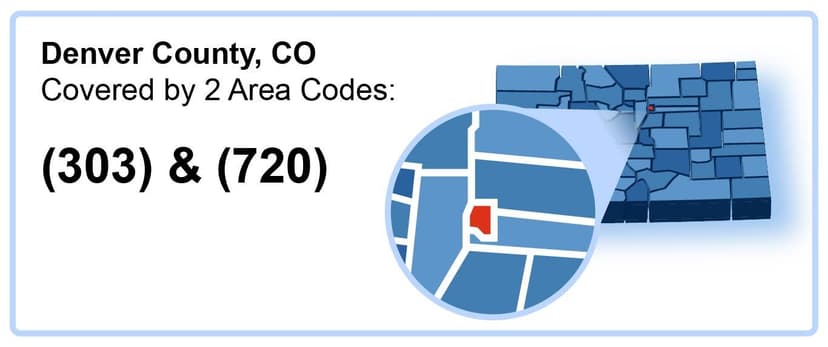What are Denver County Area Codes?

Denver County area codes are the preceding three-digit codes of all the 10-digit phone numbers in the county. Assigned by the North American Numbering Plan (NANP), area codes identify different Numbering Plan Areas (NPAs) in the various service territories. The Colorado Public Utility Commission (CPUC) is the body authorized by the Federal Communications Commission (FCC) to manage and implement Colorado area codes.
The currently active area codes in Denver County are the 303 and 720 area codes:
Area Code 303
Area code 303 is a Colorado telephone area code that covers Denver County and parts of several other counties in the state.
Area Code 720
Created in 1998 as an overlay for the 303 NPA, area code 720 covers the same locations served by area code 303.
What are the Best Cell Phone Plans in Denver County?
About 61.4% of adult Coloradans had adopted wireless-only telephony services while only 3% of them solely used landline phones for telecommunications. This was according to the report from a 2018 CDC survey. The survey also reported that an estimated 67.9% of the children (below 18 years) in Colorado homes only used cell phones. Less than 1% of them used landline phones exclusively for telephony services. These statements indicate that wireless telephony services are fast replacing traditional phone services in the State of Colorado.
The widespread adoption of wireless telephony services in Denver County is also driving Voice over Internet Protocol (VoIP) adoption. With reliable broadband internet connection, VoIP service offers a third telephone service option for Denver County residents at more affordable rates. It is especially useful for long-distance calls. VoIP service also supports video calling and several other applications. Many institutions in Denver County now hold real-time virtual meetings using VoIP services.
The four major phone carriers in the United States all serve Denver County excellently. Sprint provides the best coverage at 96%, T-Mobile offers 84% coverage while Verizon and AT&T cover 82% and 74% of the county respectively. The network strength of each of these phone carriers varies by location. Residents in the remote areas of Denver County generally do not enjoy the excellent network services obtainable in the urban areas.
What are Denver County Phone Scams?
Denver County phone scams are the frauds committed within the county using telephony services. These frauds usually lead to financial losses and identity theft for persons who fall victim to them. Phone scammers employ various tricks to convince their targets to send money and disclose sensitive information. If you suspect that phone scammers call you, use reverse phone lookup services to verify the callers’ true identities.
The Denver District Attorney's Office (DDAO) updates residents with fraud alerts to keep them abreast of current phone scams in Denver County. These alerts help residents familiarize themselves with how phone scammers operate and how to avoid falling victim. Other agencies that protect Denver County residents from phone scams include the Federal Trade Commission (FTC) and the Colorado Office of the Attorney General (COAG). The commonly committed phone scams in Denver County include:
What are Jury Duty Scams?
Do not worry if you receive phone calls from persons alleging that you did not appear for jury duty. Scammers pretend to be officers of the court or the Denver Police Department and contact residents over missed court appearances. Reverse phone lookups on the phone numbers used can reveal information on the callers and their locations. These fraudsters ask their targets to pay fines for not appearing for jury duty to avoid immediate arrests. These scammers typically request payments via wire transfer or gift cards.
If their targets claim ignorance of any summons, these scammers exploit their confusion to glean personal information. They ask for social security numbers, dates of birth, addresses, and other personal details supposedly to verify that the targets received summons. It is crucial to note that law enforcement agencies will never contact residents over the phone for missing jury duty. They will also neither threaten anyone with arrest nor ask for payments via odd channels. If you are a victim of a jury duty scam in Denver County, file a complaint with the Denver Police Department by calling (720) 913-2000. You can also report to the Denver District Attorney's Office on (720) 913-9179.
What are Arrest Warrant Scams?
Scammers can impersonate officers of the Denver Police Department to demand payment for fake arrest warrants. They threaten their targets with arrest if they do not pay to settle bogus warrants. Locals who received these calls reported that the scammers requested payments by prepaid cards and wire transfers.
Denver County residents who get these types of calls should not succumb to the threats. Hang up and contact the Denver County Court on (720) 337-0464 to verify if there is a warrant out for you. The Denver Police Department emphasizes that it will never request money to settle arrest warrants or threaten residents over the phone. Denver County residents who may have fallen victim to arrest warrant scams can report them to the Police Department by calling (720) 913-2000. They can also file complaints online with the Colorado Office of the Attorney General (COAG).
What are IRS Scams?
If you are contacted by persons who claim to be IRS agents, asking you to disclose or verify your personal information, end the call. Do not attempt to engage in further conversations to avoid falling victim to a scam. Applications that offer phone number lookup services can help uncover the identities of unknown callers. The IRS scam is one of the prevalent phone scams in the United States for stealing taxpayers' sensitive information and money.
These scammers will pretend to be IRS agents when they call and say that their targets have unpaid taxes. They will ask for personal information such as social security numbers and home/office addresses supposedly for verifications. The scammers will insist that overdue taxes be paid immediately to avoid arrest. They request payment by preloaded debit cards, iTunes cards, and wire transfers.
The Internal Revenue Service (IRS) warns that it will never call residents to request payments over the phone and threaten arrests. Persons who receive these calls and are unsure of their tax statuses can verify the callers' claims from the IRS by calling 1 (800) 829-1040. If you are sure you do not have delinquent taxes, report the call to the TIGTA by calling 1 (800) 366-4484 or online. Residents who are victims of IRS scams can file complaints online with the FTC and indicate "IRS phone scam" in the comment field.
What are Kidnapping Scams?
In kidnapping scams, fraudsters will call targets to inform them that they have their loved ones hostage. In exchange for them, they demand huge amounts of money. They will threaten to take hostages to places far away and kill them if the ransoms are not paid. They ask to receive payments by wire transfer, bitcoin, and retail gift cards. They typically hold their targets on the phone until they pay to prevent them from contacting others. The scammers will sometimes include background noises that depict violence and pain to make their claims sound real.
The Denver Police Department requests that persons who receive this type of call should contact them. They warn residents never to succumb to these threats and pay scammers. Persons who have been scammed this way in Denver County can report to the Denver Police Department by calling (720) 913-2000. Alternatively, they can file reports with the Denver District Attorney's Office by calling (720) 913-9179.
What are Robocalls and Spam Calls?
Robocalls are automated telephone calls made through auto-dialers to deliver pre-recorded messages. Robocalls were created to disseminate information to large audiences with minimal effort. Note that not all robocalls are scam calls. However, scammers use illegal robocalls with phony pitches to defraud Denver County residents. You can verify if a call from an unknown phone number is a robocall by performing a suspicious phone number lookup. To avoid falling victim to spam calls, your best choices are:
- Reject or ignore calls from unknown phone numbers. If it is important and not a robocall, the caller will leave a message for you.
- End a call as soon as you realize it is a robocall. Never act on prompts given during robocalls as doing so will open up a floodgate of robocalls.
- Block robocall numbers by using third-party applications on your cell phone. Some cell phones also have built-in call-blocking features that are efficient in blocking robocall numbers. Alternatively, report robocall numbers to your phone company and ask them to stop such numbers from calling you.
- Add your phone number to the Colorado No-Call List, and the National Do Not Call Registry. Phone numbers added to these lists are exempted from telemarketing robocalls after 31 days. It is easier to identify scam calls once you are registered on these lists.
- File the reports of unwanted calls with the FCC and FTC. Call the FTC on 1 (888) 382-1222, or the FCC on 1 (888) 225-5322 to report robocall numbers.
How Can You Spot and Report Denver County Phone Scams?
The ability to spot the tell-tale signs of phone scams is the best way to curb its menace in the county. Some government agencies provide information and scam alerts to help residents spot phone scams and avoid them. The following are signs that you are being targeted for phone scams, especially for calls from unknown phone numbers:
- Callers who claim to be employees of government agencies and ask you to pay immediate fines to avoid arrests. No government agency can legally let you pay fines to avoid arrests.
- Scammers will pressurize you to pay for their investment opportunities immediately. They try and convince you that you will lose a lifetime opportunity if you fail to act quickly.
- Scammers will ask for your credit card numbers and PINs to effect payments. These are sensitive information that should not be disclosed to any third party.
- If unknown callers ask you to pay via wire transfers, gift cards, or cryptocurrencies, they are scammers. These are odd ways for legitimate entities to request payment and money sent via these channels are hard to trace once received.
- Persons who contact you to say you have won prizes but then ask you to pay some fees to receive them are scammers.
Denver County residents can report incidents of phone scams to the following government agencies. These agencies protect residents from phone scams. They include:
Denver Police Department - The DPD educates residents and investigates phone scams in the county. If you are a victim of a phone scam in Denver County, report it to the DPD at:
Police Administration Building
1331 Cherokee Street
Denver, CO 80204
Phone: (720) 913-2000
Denver District Attorney's Office - The DDAO is the principal agency charged with protecting Denver County residents. It publishes scam alerts to keep residents informed and safe from phone scams. Phone scams victims in the county can file reports of their encounters with the DDAO by calling (720) 913-9179.
Federal Trade Commission - Reports of phone scams can be filed online with the FTC or by calling 1 (888) 382-1222. The FTC manages the DNC Registry for persons who wish to stop receiving unwanted calls. It also provides guides on how to block unwanted calls.
Colorado Office of the Attorney General - The Consumer Protection Unit of the COAG is committed to protecting residents against scams by bolstering the state laws. It provides information on the prevalent phone scams in Colorado and how to avoid them. Persons who have fallen victim can file complaints online with the COAG or by calling (720) 508-6000.
